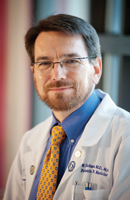Q&A: Rick Boyte
Published on December 10, 2014
Dr. Rick Boyte, professor of pediatrics, is the division chief of pediatric palliative medicine at Batson Children’s Hospital, where he has worked for 20 years.

Dr. Rick Boyte
Boyte’s first 16 years at Batson were spent in the Pediatric Intensive Care Unit. During that time, he discovered and delivered palliative care within the PICU. Boyte equates palliative medicine with a second warm blanket on a cold night, saying it is an option overlaying and enhancing traditional care for children with life-limiting illnesses. By focusing on a child’s total pain – whether physical, spiritual or psychosocial – palliative care enhances the quality of life for a child and family by minimizing suffering and offering support in whatever capacity it is needed.
1. Why did you choose pediatrics?
People told me from the beginning of medical school that my personality would fit pediatrics. I think because of that, I actually rejected it for three years. Pediatrics was the last rotation I did and I felt very much at home with it. I liked engaging with children. I liked the idea that we were being helpful, not just to the patient, but to the family as a whole. All of it kind of just fell together for me. So people were right, I just didn’t see it.
2. You started in pediatric intensive care; what made you change to palliative medicine?
I think it’s something you have to find or be led to. There’s no doubt that I would not have chosen palliative care without first having had the critical care experience. It’s similar in the sense that we’re still dealing with medically complex patients. There’s an incredible need to support the family, but the crisis is totally different. It’s not an acute crisis. It’s more of a chronic state of need for the family. I actually credit the families that I saw in the PICU, too. That kind of helped push me in this direction because it was watching them go through their experiences that I started to realize that they needed more help. I would always find that helping them through their journey was very meaningful.
3. What do you tell your children about what you do?
It’s a struggle because I went from critical care, where it’s easy to tell children especially that I treat some of the sickest kids that come to the hospital. But you know, I have the same answer now as I did then. They’re older now, so it’s easier to explain, but I do tell them that I treat some of the sickest kids that come to the hospital, kids nearing the end of life, kids often without the possibility of a cure.
4. Is it true that some people equate palliative medicine with giving up?
Doctors more than parents.
5. Is that changing?
It’s a constant fight. It’s a matter of showing people, not telling them. The key is coming in and demonstrating that we’re there until whatever outcome there is. We do have to try and explain ourselves to some families.
6. What’s the most important part of your job?
The child is always the most important part. Trying to find ways to enhance their quality of life, I’d say that’s the most important part. Even as we go through struggles and difficult situations as a team, we always try to refocus and say, ‘Okay, what’s the most important thing here?’ and it goes back to making sure the patient is taken care of.
For more information about the Division of Pediatric Palliative Care, please call (601) 984-2940 or visit us online at http://www.ummchealth.com/palliative/


